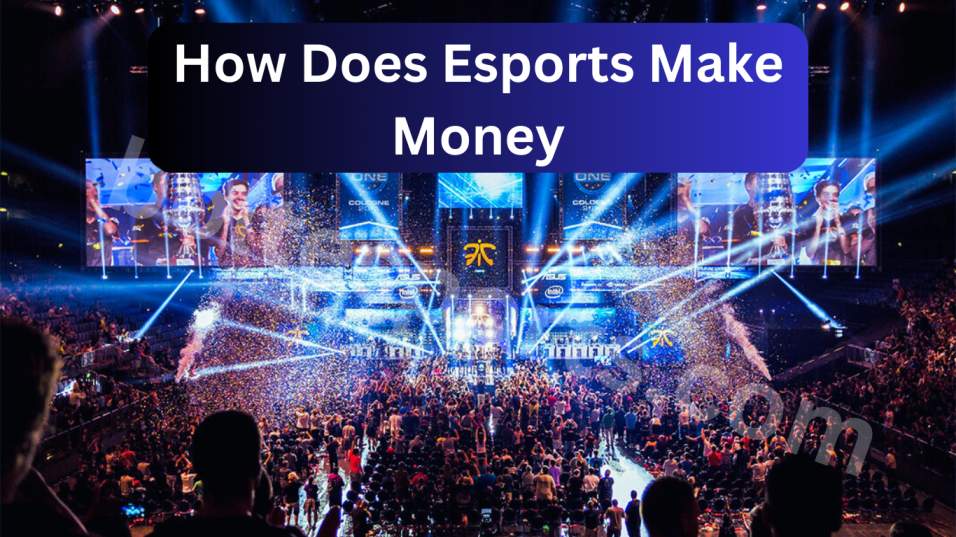Esports, which stands for electronic sports, is a form of organised video game competition in which professional individuals or teams participate. League of Legends, Dota 2, and Counter-Strike are all well-known games. Through websites like Twitch, esports events like local matches and worldwide championships garner sizable live and online audiences.
Professional athletes go through intensive training, much of the time with coaches and support personnel, similar to conventional athletes. With significant prize pools, endorsements, and a devoted fan base, esports have become a worldwide phenomenon that blurs the distinction between competitive gaming and sports.
Table of Contents
How Does Esports Make Money
Esports make money from a variety of sources, much as traditional sports. Over the years, the esports sector has expanded substantially, and its revenue sources now include.
Game Sales and Microtransactions
Esports gamers frequently purchase games, which brings in money for game publishers and creators. Microtransactions, which players buy to personalise their gaming experience, are also included in a lot of esports games. These include in-game skins, cosmetics, and loot boxes.
Advertising and Sponsorships

Advertising: Esports competitions draw sponsors that are looking to connect with a sizable and enthusiastic audience. During live streams, broadcasts, and on the grounds of events, advertisements may be shown.
Sponsorships: Esports teams, players, and tournaments frequently acquire sponsorships from businesses wishing to market their goods or services to the esports audience. These sponsorships might include resources like funding, gear, and exposure for brands.
Merchandising and Apparel
Team Merchandise: Branded goods from esports organisations are sold, including hats, sweatshirts, and other apparel. The purpose of purchasing these items is for fans to support their favourite players and teams.
Event Merchandise: Official merchandise stands where fans may buy branded things associated with the event or the games being played are frequently present at major esports competitions.
Also, Read Can Esporta Members Go to LA Fitness
Media Rights and Broadcasting

Media Rights: Esports leagues and competitions have the option of selling their broadcasting rights to publications, streaming services, and television networks. Included in this are the privileges to broadcast live matches, recap shows, and unique content.
Streaming Platforms: Events in the esports industry are frequently broadcast on websites like Twitch, YouTube Gaming, and Facebook Gaming. These platforms pay for the sole right to broadcast material, or they split advertising money with the event planners and content producers.
Ticket Sales and Live Events
Ticket Sales: Fans who want to see esports events live are sold tickets by the organisations hosting the competitions and tournaments. These occasions might range from modest neighbourhood contests to huge world championships conducted in arenas or conference centres.
Fan Experiences: For those willing to shell out more money for extra advantages and opportunities to engage with players or teams, several events offer VIP packages or premium experiences.
Prize Pools and Crowdfunding

Prize Money: Prize money from competitions makes up a major amount of the esports industry’s income. These pools are financed by a combination of crowdfunding, event planners, and game publishers.
Crowdfunding: Some games enable players to directly contribute to prize pools by making in-game purchases or taking part in crowdfunding initiatives, which increases the total amount of prizes awarded.
Esports Betting and Gambling
Betting Platforms: Esports betting services let fans wager on things like player performance, match results, and other in-game happenings. These websites make money by taking a cut of the bets that are placed.
Skin Gambling: Virtual in-game objects (also known as skins) are occasionally utilised as betting currency. In some areas, this practice has run afoul of laws and regulations.
Also, Read Top 20 New Technology Trends for 2023
Content Creation and Streaming

Content Creators: On sites like YouTube and Twitch, well-known esports athletes and celebrities produce content. Ads, subscriptions, donations, and sponsorships from their fan base are all ways they can make money.
Subscription Services: Streaming services provide subscription models that let users pay a regular price in exchange for benefits including ad-free streaming to support content producers.
These sources of income work together to assist players, teams, event planners, and the expansion of competitive gaming as a whole while also boosting the financial success of the esports business.
conclusion
Esports has developed into a complicated sector with a wide variety of revenue streams. It provides significant cash for developers, teams, and players through game sales, microtransactions, advertising, and sponsorships. While goods and live events directly engage fans, media rights and broadcasting agreements increase their reach. Prize pools, crowdfunding, and esports betting all contribute to the organization’s financial strength.
People can now monetise their passions thanks to the explosion in content development and streaming services. Esports demonstrate their potential to capture worldwide audiences as the distinctions between sports and video games become more hazy by providing a dynamic mix of entertainment, competition, and financial opportunity.
How do sponsorships benefit esports?
Sponsorships give organisations, athletes, and events financial support. The esports audience, which is frequently youthful and tech-savvy, provides visibility for brands. The industry benefits financially from this mutually beneficial connection.
Why is merchandise important for esports revenue?
Fans enjoy wearing jerseys and other items of apparel and accessories bearing their favourite team’s logo. In order to increase overall revenue, major events also provide official items.
How do esports tournaments attract investments?
Investors that are aware of the industry’s growth potential invest in esports organisations, competitions, and related technologies, which increases profitability and encourages growth.
Is esports betting a significant revenue source?
Regulations must be taken into account, although esports betting platforms and skin gambling both increase esports make money through wagers.
How has media coverage affected esports profits?
Esports’ profitability and reputation are further increased as a result of increased advertising and sponsorship income from mainstream media coverage.
How Does Esports Make Money?
By tapping into a rising worldwide audience, esports make money through sponsorships, advertising, media rights, ticket sales, merchandise, and backing from game publishers.
